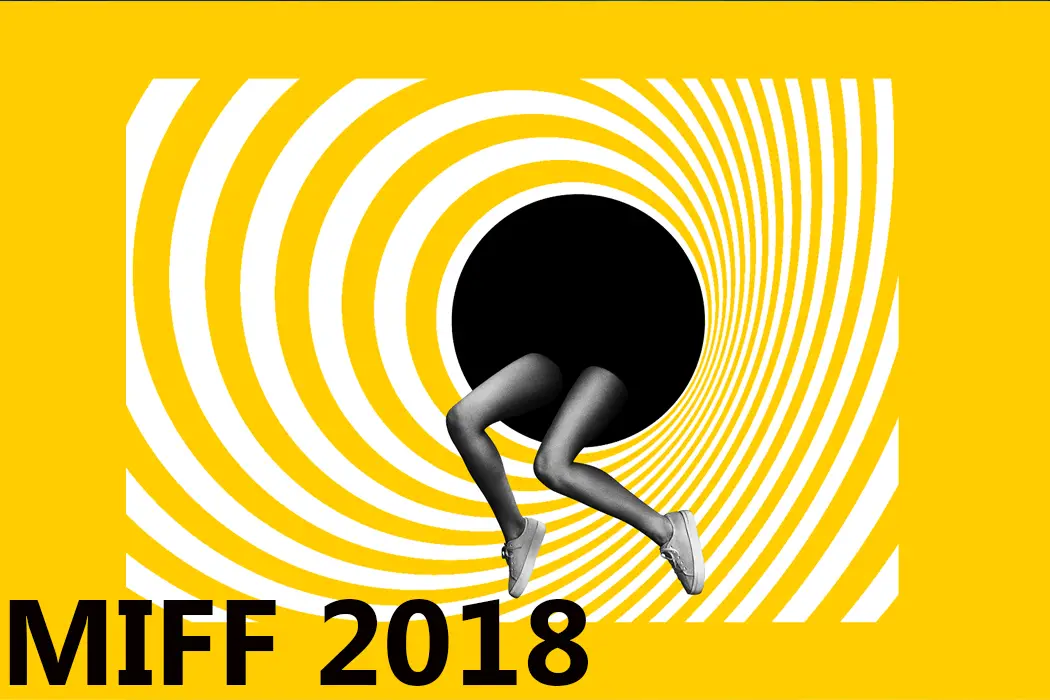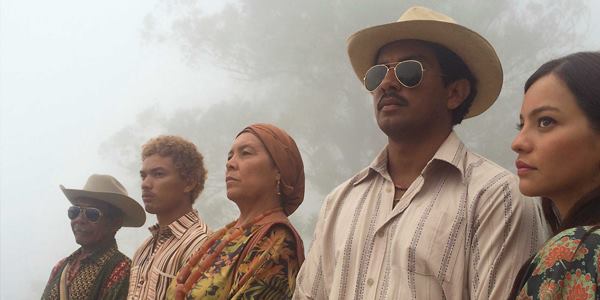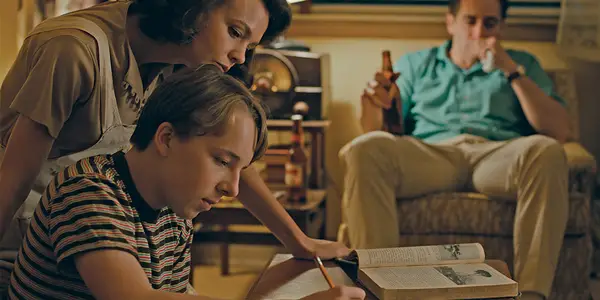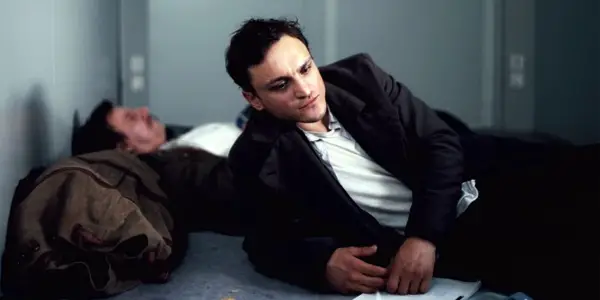Melbourne International Film Festival 2018: The First Weekend Report

Alex is a 28 year-old West Australian who has a…
A year after my first visit, it feels good to be back at the Melbourne International Film Festival, the biggest film event in the Australasia period and for most Australians – the only chance to catch the best of what international cinema has to offer. Kicking off with Paul Dano’s sensitive directorial debut Wildlife on Thursday night, my experience has been filled with 8 screenings in just 3 days.
Much like my Revelation Perth Film Festival report, I’ve chosen to review some of the more underrepresented titles below, which include Columbian crime dramas, a time-bending German war film, and an experimental exercise in young adult race relations.
Murder Me, Monster (Alejandro Fadel)

Alejandro Fadel’s Murder Me, Monster is another entry into a newly thriving trend of arthouse genre films that I have dubbed ‘ASMR Horror’, minimalistic genre exercises which trade exploitation indulgence for quiet psychological terror, that much like ASMR, seems to only cause chills for a limited number of people – leaving those unaffected completely bored and baffled.
It’s a divisive genre, and whilst some may classify Hereditary in this lot, it moreso covers other recent opaque titles such as It Comes At Night, A Ghost Story and I Am The Pretty Thing That Lives in the House, ‘post-horror’ releases that favour mood and atmosphere over jump scares and escalating body counts. Fadel’s third feature passes every landmark of this proliferating movement, a potentially interesting thriller dulled by an incomprehensible blend of obvious sexual metaphors and stale police procedural clichés that, for an Argentinian monster movie, should be way more captivating than it is.
‘An Argentinian Monster movie’ isn’t the only alluring factor that Murder Me, Monster deceitfully promises, as its opening shot is an all-timer: within a herd of sheep in Mendoza, an isolated town high in the Andes Mountains, a woman steps out with her throat slit. This isn’t your typical PG-13 thin red line of blood, as Fadel really gives us the grisly details of her open slash wound. We see tendons, torn muscle and even some bone exposed, before delivering the punchline that this butchered woman is momentarily still alive – before having her whole head hit the floor, sans body. It’s both horrifying and beguiling in equal measures; it’s just a shame that the rest of the film never hits these same levels of visceral detail and visual distinction. The decapitated woman is another victim in a string of similar murders, an alarming case that has the sombre Detective Cruz (Victor Lopez) on the hunt, who starts to trace the wave of bloodshed to an inexplicable occult creature, whose protracted penis tail and toothy vagina jaw makes it more metaphor than monster.
It’ll take more than a detached group of Argentinian cops to crack exactly what that metaphor is, as any definable cultural, political or literal meaning behind the complicated supernatural case is buried under layers of monotonous characters talking in laboured whispers. After the fourth scene of apathetic men communicating via furrowed brows, any sense of engagement, both narratively and thematically, quickly departs. It’s hard to distinguish the supernatural from the normal when everyone behaves in an unnatural manner – at least David Lynch made Twin Peaks entertaining on a surface level. It’s hard-edged, elliptical and wholly without the comforts of traditional story structures, a paradoxical film about repression that itself feels repressed.
Tyrel (Sebastián Silva)

References to Get Out are bound to be plastered all over any marketing material for Sebastian Silva’s latest examination of loneliness, Tyrel, for obvious reasons: Jordan Peele’s Oscar winning social thriller, which saw a black man have his concerns about visiting an all-white retreat become hauntingly realised, shares the exact same plot setup as Silva’s mumblecore comedy, even down to including Caleb Landry Jones as a quivering dirtbag who openly accosts the single black guest. What separates the two films, though, is that Peele was smart enough to camouflage his messages, whilst not exactly in the most subtle fashion, within the framework of a crowd-pleasing horror movie, recalling the fist-pumping cathartic vengeance of 1970’s blaxploitation pictures.
With Tyrel, Silva goes for a more understated direction, playing with our heartbreaking expectations that just because Tyler, played by the terrific Jason Mitchell, is the only black man on a weekend retreat surrounded by a growing number of drunk white guys, that something bad is going to happen to him. It’s this sole realisation, the utter fact that we expect the worst from these characters, which makes for a really interesting twist on the ‘cabin in the woods’ formula, but it turns out that exploring this idea in a feature-length format doesn’t exactly make for compelling viewing in this well-intentioned but tedious study of millennial masculinity.
During Trump‘s 2017 inauguration weekend, Tyler (Mitchell) has decided to join his friend Johnny (Christopher Abbott) in attending a 2 day-long birthday celebration for Pete (Caleb Landry Jones), a boozy affair hosted in an isolated cabin where their only limitation is the reception on their cell phones. Silva initially nails the awkward social dynamics of being the third wheel at a party where everyone is friends except for you, which includes bouts of indifferent small talk and the need to get friendly with the dog of the house. This uncomfortable feeling of alienation is amplified by the glaring racial divide, one which is escalated during an early drinking game where Tyler is forced into performing a “black accent”, a ridiculous caricature that quietly confirms his role within the party: a token of racial validation for these intoxicated men.
As the Irish coffees start piling up, so do the guests, including a lively Michael Cera, who compels Tyler into a night of excessive drinking, which leads to the film’s most scarily accurate sequence; the trials and tribulations of having to deal with someone who’s absolutely trashed but fails to recognise it – introducing another twist of tension that feels undeveloped, especially when the drunken outsider is handed a machete and ordered to attack a Donald Trump-shaped pinata (but don’t worry, we’re in Boyhood territory here in terms of ignoring obvious narrative setups).
These explicit Trump references feel gratuitous, as the film’s application towards today’s societal atmosphere is pretty clear from the beginning; the need to cram in voice-clips of Trump’s inauguration speech and literary nods to Lord of the Flies feel like an overcompensating attempt at clarification – when you have the white kids proudly crooning R.E.M’s “It’s the End of the World As We Know It” as they dance with the Trump piñata, it starts to feel like we’re being belted into submission.
The mumblecore delivery doesn’t help elevate the material either, as Alexis Zabe’s documentary-like cinematography makes us feel like we’re watching private footage of these talented actors in their off-time as they’re making another, better movie off-screen. The camera isn’t afraid to get close and intimate with these guys, but it’s nothing that you haven’t seen before from any micro-budgeted college project about the misfortunes of a sad white hipster, the type of micro-budget experiments that the Duplass Brothers helped populate in the early 2000’s. Late appearances by Ann Dowd (who’s gonna have to work hard to win back our cinematic trust after Hereditary) and the late, great Reg E. Cathey also feel wasted, just more evidence that if given a bit more polish, this could’ve been something great. Instead, it’s just the lost tapes of a lost weekend, a dry, casual exercise in trying to mine today’s heated political climate for any semblance of social poignancy.
Birds of Passage (Cristina Gallego, Ciro Guerra)

Following in the footsteps of Rainer Werner Fassbinder, Columbian director Ciro Guerra has made a series of critically acclaimed films which have depicted the tensions that arise when jealousy, prejudice, exploitation and greed form within small groups and communities. His ability to form elegant, epic meditations on forgotten societies have included peeks at Amazonian tribes in the Oscar nominated Embrace of the Serpent and the musical side of Caribbean culture in The Wind Journeys. He continues this trend with Birds of Passage, his first feature to be co-directed with his wife, producer Cristina Gallego. This time, Guerra takes us back to the 1970’s to examine how the early days of drug trafficking caused the deprivation of the Wayuu people of Columbia, borrowing the structure and ethos, but not the tone, of Hollywood crime dramas, for this terrific, violent reflection on the importance of one’s beliefs and culture in a world which demands constant conformity.
Under the bright sun’s harsh glare, one which mirrors Gallego and Guerra’s own consistent gaze, Zaida (Natalia Reyes), after a year in ceremonial confinement, has emerged a woman, ready to be married off by her authoritative and superstitious mother Ursula Pushaina (Carmiña Martínez). During her courtship ritual, which sees her chasing potential suitors in a red dress in a fashion similar to an interpretative dance routine of a bullfighting contest, she meets the arrogant Raphayet (Jose Acosta), who wishes to marry her.
Lacking the ancestral prestige or steady wealth to impress her mother, Raphayet is forced into dealing with alijunas (a term for civilised people) to afford the dowry which would secure their marriage. This forces him into developing his casual side-business of selling crates of alcohol into a grand enterprise of exporting coffee bags full of marijuana to Americans, using crops which are grown by his unflinching cousin Anibal (Juan Martinez), a partnership that over several troubled decades, descends into a full-blown bloody war, highlighting the corrosive impact Western influences have on these traditional people.
By bookending the film with songs from an elderly blind man, whose chants about the loss of the Wayuu people’s culture are warbled into an vast empty desert, Birds of Passage effectively translates the nature of preserving traditions through multiple, developing generations of people. Cultures, memories and antiquated ways of life are only kept alive through the continued preservation by their descendants, and Maria Camila Arias and Jacques Toulemonde Vidal’s screenplay informs us of the tragic consequences of ignoring your ancestral roots (the story is sectioned off into 5 chapters, labelled ‘songs’, which reinforces this theme). Layering this crime drama with a level of mysticism not only manages to maintain the contemporary understanding of the Wayuu people, but also breathes some new life into the “rags to riches” crime thriller subgenre, a bloated genre that’s been consistently diminished since Howard Hawks perfected the formula back in the 1930s.
Wildlife (Paul Dano)

Early on in Paul Dano’s directorial debut, Wildlife, a group of school children are being advised about the dangers of wildfires, a lecture being delivered as one actively rages on in the background. Joe (Ed Oxenbould) starts to write notes, but a fellow classmate flippantly warns him “there’s no point, all you can do is run away”. She’s not wrong – their force, speed and unpredictability are apocalyptic in nature, and simply waiting around doing nothing is a guaranteed cause of death. It’s a sensibility that can applied to the marriage of Jerry (Jake Gyllenhaal) and Jeanette (Carey Mulligan), two distinctive romanticists whose crumbling partnership starts to leave its own trail of irreparable damage in its wake, mirroring the spreading blaze that kickstarts their matrimonial issues.
Adapted from Richard Ford’s 1990 book of the same name and set in 1960’s America, the idea of running away from your problems seems to be the driving force for Jerry, whose athletic dreams have disappeared alongside any form of a dependable long-term career, which is what fuels his constant relocating. “Every time we move it gets colder” cites his wife Jeanette, who has reluctantly taken the position of ‘stay at home mother’ for their promising son Joe (Ed Oxenbould), as they adjust their new destination of Montana. The screenplay, co-written by Dano and his partner Zoe Kazan, gradually introduces us into the straw that breaks the camel’s back – Jerry has lost his latest job, a pathetic gig as a whipping boy for a snooty golf club, which forces him into accepting work as a temporary firefighter for the dangerous wildfire that approaches the city. It’s a reckless decision that triggers a series of even more reckless decisions, as Jeanette, who was able to conceal her rage beneath a measured surface appearance before, reacts with a liberating mid-life crisis, one which transforms her into a wholly different force to be reckoned with, leaving Joe as the sole spectator to her newfound decadence.
Dano’s direction is reminiscent of the coming-of-age lyricism of Terence Davies’ best work, blended with the melancholic poetry of David Gordon Green’s early films – before he transitioned into more genre material. It’s a beautifully restrained style that never wallows in the melodrama, subtly probing the traditions of American conformism and the hardships of working class heroes. His strengths are similar to those of other successful actor-turned-directors, which is the ability to draw the strongest work out of his actors, which includes a career-best performance by 17-year-old Australian actor Ed Oxenbould.
Derived from the Meisner technique, a common quote about acting is that “real acting is reacting”, which, applied to Oxenbould’s work here, would posit him as one of the strongest supporting performances of the year, delivering a mostly silent performance that manages to anchor the entire film purely through his bewildered eyes and hesitant etiquette. It’s an achievement alone that, in a film where Jake Gyllenhaal, Carey Mulligan and Bill Camp are all expectantly impressive, he manages to walk away as the most prominent feature of Dano’s captivating triumph.
Transit (Christian Petzold)

“Ports are places for stories” an anonymous narrator tells us, as he tries to understand why the crowded US embassy of Marseille is filled with so many eccentric personalities desperate to tell each other their own problematic-but-interchangeable histories. German auteur, Christian Petzold has decided to focus on just one of these stories with Transit, the third entry in his unofficial “Oppressed People of War Trilogy”, following the critically acclaimed Barbara and Phoenix, which told similar stories of mistaken identities during tyrannical times of war. Filtering Alfred Hitchc*ck’s Vertigo through 1940’s war-torn Europe, Transit is different than most films which examine existential despair and social displacement in cold, detached ways, as it successfully conveys a great level of sensitivity and humanity as well, interspersing sparks of hope within the midst of the unspeakable sadness that constantly lingers at the edge of every vibrant frame.
Told from the viewpoint of an unnamed third-person narrator (whose voiceover becomes borderline obtrusive in its literal delivery), audio-visual technician Georg (a compelling Franz Rogowski) has no way to escape France, until a quick job delivering mail accidentally secures him the paperwork of a controversial novelist named Weidel, who had secured visas and travel cheques before slitting his wrists in a French hotel. Arriving in Marseilles, the port city that is the final checkpoint for any refugee wanting to escape the incoming war, Georg is mistaken for the deceased writer, a new identity that guarantees him a safe passage into Mexico.
He’s initially hesitant to assume the man’s existence, but he quickly adapts to the role, delivering an off-the-cuff monologue as to why he no longer wants to write in one of the film’s strongest scenes. Petzold makes the clever choice to not frame this story around the tension of Georg being found out by the authorities, but how long he can personally live with this ruse, one which is complicated further when Weidel’s distressed wife, Marie (Paula Beer) shows up, frantically searching for her missing husband – whilst falling in love with the man who’s essentially profiting from his death.
One of the key elements that sets Transit apart from most bleak World War II dramas is that Petzold has made the risky decision of having 1942 France be filled with modern day anachronisms, such as contemporary military outfits and current cars, a specific visual choice that much like the troubled protagonist, may displace the audience to a fair degree (even an explicit reference to George A. Romero’s Dawn of the Dead is confusing in hindsight). The mix of modern vehicles and high-tech weaponry within a historical conflict recalls Alex Cox’s work in 1987’s Walker, an experimental decision that saw that film critically trashed at the time (but has now emerged as a cult classic thanks to the Criterion Collection).
Blending the two distinctive timelines gives the narrative a timeless feeling (especially in relation to the state of neo-nazism and the plight of refugees in both eras). It’s a smart and original way to place us within the unsettled mind of Georg, whose headspace is occupied by childhood memories of his mother and the fabricated backstory of the man he is impersonating, effectively making his own personality just another ghost that wanders the empty streets of Marseilles, a desolate town that’s more purgatory than Paris. Classical in its restraint and directness, Transit continues Petzold’s streak of being one of Germany’s strongest directors working today.
3 Faces (Jafar Panahi)

The spirit of Abbas Kiarostami is kept alive in Jafar Panahi’s meta-fictional road movie 3 Faces, his 4th feature since being banned from directing films, an ordeal that was detailed in his 2011 documentary This Is Not A Film. Once again, Panahi steps in front of the camera, a reverential observer to the ordeals of actress Behnaz Jafari, who also plays a partially-fictionalised version of herself. Despite at times feeling like a megamix of Kiraostami’s greatest hits, 3 Faces manages to be much more than a product of its ingredients, a list of cinematic components which would include the car-driving conversations from Taste of Cherry, the gentle meditation of Iranian village lifestyles of The Wind Will Carry Us and the liberation of women’s rights from Ten, whisked with a welcome dose of empathetic humour and closely observed examinations that make for another success for the outlawed director.
Once again blurring the line between fact and fiction, 3 Faces begins with Jafari and Panahi on the road, a late night drive to an isolated Turkic village in order to investigate the truth behind an alarming video that they’ve been sent: a shot-on-phone call for help from Marziyeh Rezaei (also playing herself), who appears to commit suicide over her family’s refusal to let her pursue her dreams of acting, whilst desperate pleading for Jafari’s help in a manner that’s reminiscent of Eminem’s infamous lyrics for Stan. This video, and the actresses troubled reaction to it, are all introduced in one long impressive 15 minute unbroken shot within the confines of Panahi’s car, as he proudly wears Kiraostami’s influence on his sleeve – it’s a tribute that breeds affection, not contempt. Not to be misled, much like Behzad Dorani’s investigation into one Kurdish village’s mourning rituals in The Wind Will Carry Us, this is not a simple missing-person mystery, as Panahi uses this quest as a pathway to explore gender dynamics, the shift of traditional values, and the meaning of fame within the different communities they come across.
Along their travels, they come across a variety of distinctive personalities that include a destitute former actress turned painter, the owner of Iran’s horniest bull and one determined father who insists that the filmmaking pair deliver his son’s foreskin to his favourite actor, a masculine idol who, much like the virile bull they meet, represents the ideal qualities of traditional masculine culture. This obsession with potency, especially in its toxic use to control women, is one of Panahi’s main targets with his work here, but luckily he is intelligent enough to allow everyone to speak for themselves in regard to the issue. Despite being a director, within the constructs of this film he acts in the opposite fashion, a listening, observing and passive figure who allows all of the participating residents to direct him and Jafari in their surprising journey.
What are some of the festival favourites that you’re looking forward to?
Does content like this matter to you?
Become a Member and support film journalism. Unlock access to all of Film Inquiry`s great articles. Join a community of like-minded readers who are passionate about cinema - get access to our private members Network, give back to independent filmmakers, and more.













